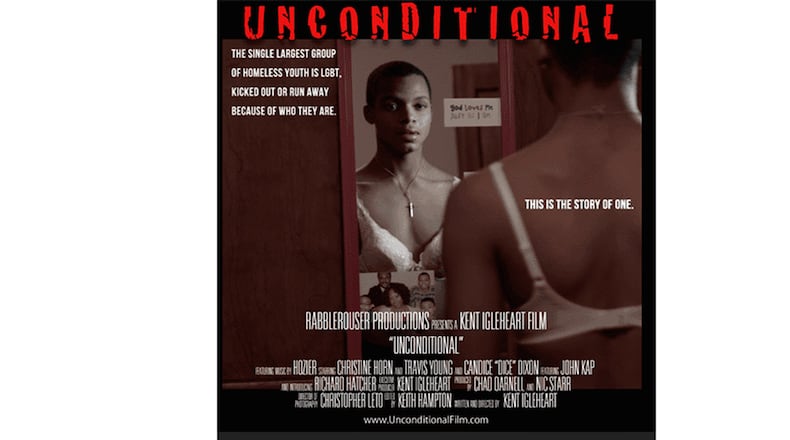The opening scene of “Unconditional,” a short film written, produced and directed by a local city official, introduces a juxtaposition that’s painful to watch. Bradley, an LGBT teen, looks in the mirror as he dons red lipstick, a complement to his polished nails.
A sticky note on the mirror says, “God loves me as a I am.” Bradley kisses his cross necklace.
Suddenly, the scene switches to Bradley’s parents, with pained faces, talking to their minister. Mom expresses a desire to embrace her son unconditionally. God, religion — and the family minister — get in the way.
What a conundrum — a family chasm some lesbian, gay, bisexual and transgender youth experience trying to find their way. And that’s what Kent Igleheart, a Roswell city councilman, strove to capture in a haunting 26-minute movie.
Two years ago, Igleheart says he became aware of homeless teens, particularly LGBT youth, when he heard an NPR story on the topic. The report said 40 percent of New York City’s homeless youth identified as LGBT. He questioned the percentage.
“Turns out, not only is it true, but it’s over 50 percent in the South,” said Igleheart, a 1981 Clarkston High grad and son of a retired Southern Baptist minister. “I thought that this was a story that had to be told. I also had a long-standing desire to tackle the whole issue of LGBT and religion. There are so many conflicts and contradictions in the overall subject that it is a great subject matter for film.”
For research on teen LGBT homelessness, Igleheart talked to staff, counselors and teens at Lost and Found Youth, an Atlanta nonprofit that serves the city’s homeless LGBT population. Though area actors and actresses were hired to film about town, the script draws from actual experiences of young people.
Consider: Daniel Ashley Pierce, a gay Kennesaw teen who nearly a year ago secretly recorded a family intervention that got him kicked out of his home. Pierce appears in one movie scene, though with no speaking part. Likewise, Bradley, the main character played by Richard Hatcher, doesn’t speak in the movie save for one line.
“That was the most challenging part of the film,” said Hatcher, 19, a Tri-Cities High grad who studies acting at Chicago’s Roosevelt University. “Kent and I talked about it and tried to make sure every scene was believable and showed (Bradley’s) true emotions.”
Igleheart has helped produce smaller projects, done some camera work, written scripts and plays, and acted in theater, film and TV. You can catch him in “The Last Punch,” a locally filmed movie that tells the story of a promoter for Muhammad Ali’s last fight. “Unconditional,” meanwhile, is his first turn at directing.
“A director friend recently asked me what was my favorite part,” Igleheart, 52, told me. “I said, ‘All of it.’ I want to create films that make people feel strong emotions and think deeply. People often think of LGBT-religion issues as ‘us’ versus ‘them.’ The only way to humanize things is to show real people involved.”
About the Author
Keep Reading
The Latest
Featured


